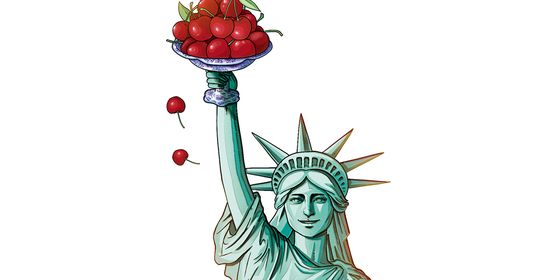Feeling a bit behind the times? Liz Tung helps you get cool as a cow with this slang tutorial.
As anyone who’s ever hung out with older, un-hip relatives knows, there’s nothing worse than hearing slang misused. Slang (俚语 líyǔ), after all, is like music or a good joke—when used well, it sings; used badly, it falls flatter than first-round contestants on American Idol.” Which is why when my Chinese teacher, a hip, affable guy with a faux hawk, started replacing our usual lessons with popular sayings, I immediately took notice. Not only would this prevent me from saying the Chinese equivalent of “this eggplant is so phat!”, but the slang turned out to be a window into the creative and mischievous spirit of China’s young people. Because let’s face it—no one produces slang that is better, funnier, weirder or meaner than the young’uns.
In an effort to pin down some of the best slang from recent years, I consulted Eveline Chao, author of the recently released Chinese slang bible, “NIUBI!”. Based on her expert recommendations (and notes from my Chinese class), here are some of the most interesting and popular slang to emerge in the last ten years. Check it out—it’s totally the bomb.
THE CHINESE “BUTTERFACE”
The first time my teacher introduced this little nugget in class, I remember being frozen in a kind of horrified amusement. The feminist in me told me to whack him across the nose, but the teenage boy in me (we all have one) couldn’t help giggling. “Do you know what we call ugly girls?” he asked us. We shook our heads. “恐龙 (kǒnglóng),” he said triumphantly, then waited a beat: “Dinosaurs.” It’s not clear where this rather cruel epithet came from. There’s a story floating around online that it dates back to a royal wife from the Three Kingdoms era who, though beloved and respected, was renowned throughout the land for her ugliness. Her name (in different characters) was Kong Long, which evolved into the pun 恐龙. A simpler explanation goes that seeing a really ugly girl is as rare and miraculous as seeing a dinosaur since they’re, you know, extinct. Worst of all? “We call Tsinghua University ‘Jurassic Park’!” my teacher burst out, collapsing into giggles. Sigh.
My blind date was such a dinosaur.
Wǒ xiāngqīn de duìxiàng shì ge kǒnglóng..
我相亲的对象是个恐龙。
THE ALL-PURPOSE “AWESOME” WORD
If there’s one Chinese slang word that all foreigners know, it’s 牛 or 牛 B (niúbī), which roughly translate to “awesome” or “badass.” The word can also be used negatively, to mean egotistical or self-important. Though the background on this most pervasive of slang words is murky, Chinese netizens estimate that it emerged in the 90s and is derived from the saying 吹牛皮 (chuī niúpí), which means “to brag.” (The saying literally means “to blow cow hide,” referring to the old practice of inflating cow hides to cross a river—something that requires lot of lung power, which braggarts naturally have.) Online, 牛B is written using any of several characters with the pinyin pronunciation “bee,” and sometimes simply as NB.
This band is totally awesome!
Zhège yuèduì tài niúbī le!
这个乐队太牛逼了!
THE INSINCERE SHOCK WORD (A.K.A. “ANYTIME FILLER”)
If you look up 晕 (yūn) online, followed by the words shi shenme yisi? (是什么意思? What does it mean?) you’re bound to find at least several “Yahoo Questions”-like sites filled with young, hip netizens trying to explain the meaning of 晕 to old fuddy-duddies like you and me (or see Charlie Custer’s explanation for using it in web chats in our 2011 May issue). As you’ll see by the scores of answers that begin with, “Well that depends on…” it isn’t an easy term to pin down. So let’s take it from the beginning. Yun literally means “dizzy” or “faint” and can be used in response to any emotions that might make you feel faint, including (but not limited to): surprise, shock, confusion or disgust. The number one answer on Baidu Zhidao sums it up by saying, “Anything that makes you feel helpless, or that you can’t stand, you can respond to with yun.” You can also, the answerer says, use yun as filler word whenever you don’t know what to say. This, Chao agrees, is the way she hears it used most. “This seems to be a really common, bored response to things,” Chao says. “It’s comparable to the really automatic way young people used to say ‘whatever’ or ‘loser.’” Similar in that respect, I might add, to “weird” or “drop it like it’s hot
I came to work early yesterday, and then I realized it was Sunday.
Wǒ zuótiān yídàzǎo qù shàngbān, ránhòu cái jì qǐlái zuótiān shì xīngqītiān.
我昨天一大早去上班,然后才记起来昨天是星期天。
Whoa, that’ s crazy.
Yūn a ⋯⋯
晕啊⋯⋯
THE SINCERE SHOCK 牛逼 WORD (A.K.A. OHMIGOD!)
雷 (léi) literally means “thunder,” but thanks to the all-powerful internet the word has recently undergone a transformation in meaning, from the epic accoutrements of Thor, the Norse god of thunder, to… ohmigodohmigodohmigod! To put it more plainly, 雷 has come to indicate shock, surprise or outrage—any emotion, Chao says, that might be represented by the image of someone being thunderstruck. “On both the internet and in real life 雷人 (léirén), literally ‘thunder person,’ has come to mean outrageous or shocking or absurd,” she says. “One especially common expression is 太雷人了 (tài léirén le), meaning ‘too outrageous’ or ‘that’s so stupid’ or ‘that’s insane.’”
Did you see that dog on Youku who can do the salsa? It’s totally out of control!
Nǐ zài Yōukù shàng kànjiàn nà zhī huì tiào lādīngwǔ de gǒu le ma? Tài léirén le!
你在优酷上看见那只会跳拉丁舞的狗了吗?太雷人了!
THE EXPRESSION OF EXISTENTIAL ANGST
Another common feature of youth is angst—how else do you explain teenagers’ love of grunge music, literary magazines and “The Catcher in the Rye?” The catch-all word for angst or depression in Chinese is 郁闷 (yùmèn), which, Chao says, is popular among the young folks. “It means ‘depressed’ but is used as an adjective for a much larger range of situations—when they feel pissed off, upset, disappointed, or even just bored,” she says, adding that it’s often used as a filler word, similar to saying “sigh.”
I’m depressed. . .
Yùmèn a……
郁闷啊……
I stayed up all night to write a report but I forgot to save it. I feel so depressed!
Wǒ tōngxiāo xiě de bàogào jìngrán méiyǒu bǎocún. Zhēn yùmèn!
我通宵写的报告竟然没有保存。真郁闷!
THE INTERNET ADDICTS INVENTING ALL THESE WORDS
Perhaps one of the reasons all these kids are sighing all over the internet is they don’t get out enough. It’s a sadly common syndrome for anyone with their own computer, reliable internet access and steadily declining social skills. So much so that young folks (on the internet, of course) came up with a word for it: 宅女 (zháinǚ)/宅男 (zháinán). Adopted from Japanese, the term literally means “house woman” or “house man,” and refers to someone who spends all their time indoors on the internet. Though English translations (like “shut in”) have a clearly negative connotation, Chao says that these days there’s little shame in calling yourself a 宅女/男: “It seems to have become almost a proud self-identification for young people,” she says. “People will say they’re a 宅女 the way young people in the States might proclaim themselves a geek.” And as Rivers Cuomo proved long ago, there’s nothing cooler than being a geek.
He’s such a shut-in—he never goes out, just stays inside all day watching anime.
Tā shì ge zháinán, cónglái bù chūmén, zhěngtiān zàijiā kàn dòngmàn.
他是个宅男,从来不出门,整天在家看动漫。
牛逼 NIUBI SLANG BOOK
When Eveline Chao, a Taiwanese-American, moved to Beijing on a lark in 2006, the first thing she noticed about her new Chinese friends was the way they talked. “I was fascinated by the slang they used from the beginning and was jotting down terms they used for two years before I even thought of doing a slang book,” she says. After enlisting the help of local friends—everyone from Beijing DJ’s to the editor of a lesbian magazine—Chao ended up with a funny, irreverent guide chock full of colorful, at times obscene, slang straight from the streets of China. Just as valuable are the personal anecdotes and cultural context based on Chao’s experience as a foreigner living in China. “NIUBI!” is available at English-language bookstores in China or on Amazon.com.












